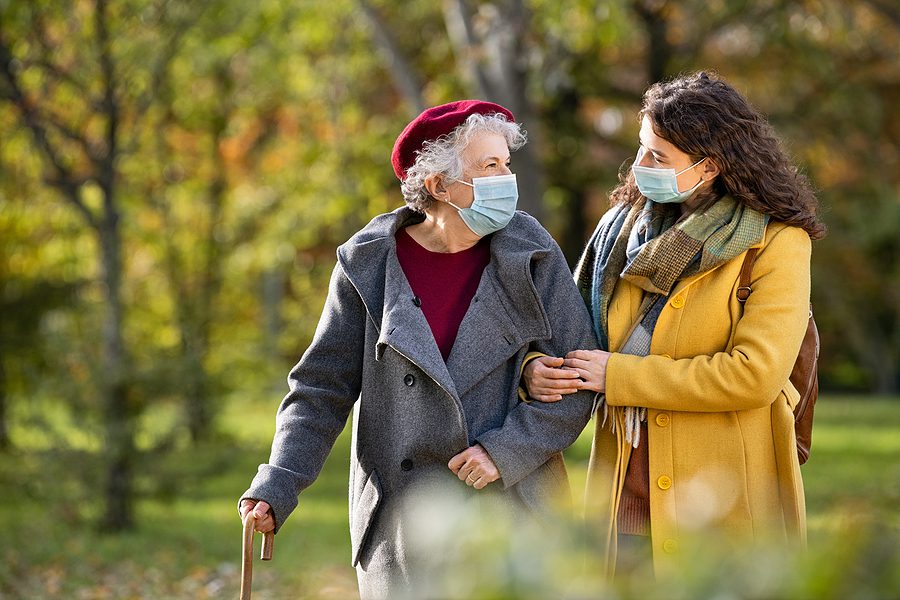After almost 2 years of COVID-19 in America, the coronavirus has become one of the leading causes of death in the country. This is especially true for the elderly population of the country. Advanced age, and the health complications often associated with it, are risk factors for the coronavirus. Because of this, the elderly and those living with chronic medical conditions are at a higher risk for severe COVID cases. This article will be discussing some of the most important things to consider for your safety as we move further into the year.
COVID Vaccines and Boosters
The risks for contracting COVID, developing a severe case, hospitalizations, and death all decrease for vaccinated individuals. Unless you have a specific condition or allergy to the vaccination, you should consider getting it. You should discuss with your primary care physician if you have any concerns about getting the vaccine. For more information on the coronavirus vaccine, visit the CDC page here.
If you are already vaccinated, booster shots are available to most of the public. Booster shots are recommended by the CDC for any adults at least 5 months after your initial immunization, or 2 months after if you got the Johnson & Johnson’s vaccine. For more information on boosters, visit the CDC page here.
Additionally, some people who have already received their booster dosage may be eligible for a fourth shot 5-6 months after their last booster. This is generally recommended for the most at-risk individuals, including the elderly.
Omicron and Other Variants
There are a number of COVID variants that have begun to spread over the course of the last two years. Of note, Omicron has been the most recent varietal to affect the American population. The Omicron variant is the most transmissible variant so far, spreading much more rampantly than the others. While initial data shows that Omicron is generally less severe than other variants, it is still extremely dangerous. This variant has been leading to a spike in COVID deaths across the country. Also, wearing the right kinds of masks, and wearing them properly, can help reduce the risk of catching/spreading COVID.
Death and Hospitalization Risks Rise With Age
Elderly individuals are more likely to be hospitalized or pass away due to COVID-19. Roughly 81% of COVID-19 deaths occur in people aged over 65. The death toll among people over age 65 is 80 times higher than that of those aged 18-29.
Pre-Existing Medical Conditions and COVID-19
Additionally, pre-existing medical conditions can also be risk factors. Many of the chronic conditions affecting elderly individuals increase the risk of severe illness. This can include diabetes, heart disease, cancer, chronic lung diseases, dementia, obesity, and more. For a more complete list of medical conditions that can increase your risk, click here.
Reducing Exposure With Others
Reducing contact with others, wearing a mask when you are out of the house, and practicing social distancing can all be important ways to limit exposure. Avoid heavily populated public spaces whenever possible. Indoor spaces that are well ventilated can also help reduce the spread of COVID. Encourage loved ones to get the vaccine if they have not already, and to wear a mask while visiting.
Testing for Coronavirus
There are a wide variety of testing centers across the city. Many of these are completely outdoor to reduce COVID risks to test-goers. Additionally, many pharmacies have begun to carry in-home test kits. Some people opt to test regularly, while others only do so after they have been with a large group, or after someone they know has contracted the virus. Additionally, some individuals are testing regularly through their job. Consider your options for testing and what may be better for you. If someone you have come in contact with has tested positive, you should get tested. Additionally, you should get tested if you are experiencing symptoms of COVID. For more information on COVID testing, click here. Visit the NYS Health Department Test Site Locator to find a site near you.
SafeHarbor and the Pandemic
SafeHarbor is working 24 hours to continue providing safe and quality home care services during COVID-19. Let us know if we can help you during these difficult times. Information regarding the novel coronavirus is changing daily. For more up-to-date information, check the CDC and WHO websites.
Safe Harbor Healthcare Services does not provide medical, healthcare, or financial advice via articles. This material has been prepared for informational purposes only. It is not intended to provide, and should not be relied on for medical advice.
Safe Harbor Healthcare Services has been providing excellent home care on Staten Island since 1967. Our services help the elderly and disabled live safely and independently; while giving their families the peace of mind they need. For more information contact us by clicking here, or call (718)-979-6900.

